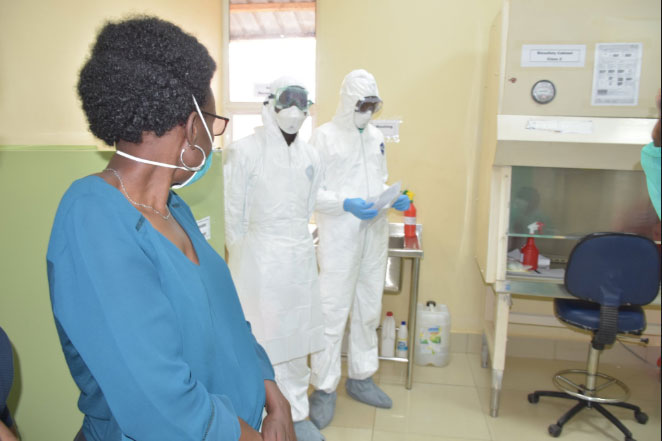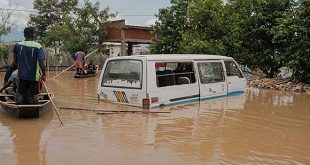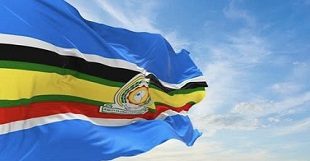
Kampala, Uganda | RONALD MUSOKE | As COVID-19 infections rise on the African continent, the World Health Organization (WHO) has warned of the havoc the pandemic is wreaking on the continent’s health workforce.
Ten thousand health workers in 40 African countries are said to be battling COVID-19 at the moment according to senior officials from the UN health agency.
As of July 23, there were 768,978 COVID-19 infections, 16,423 deaths and 434,973 recoveries in Africa according to the Africa Centres for Disease Control and Prevention.
“The growth we are seeing in COVID-19 cases in Africa is placing an ever-greater strain on health services across the continent,” Dr Matshidiso Moeti, the WHO regional director for Africa said, “This has very real consequences for the individuals who work in them, and there is no more sobering example of this than the rising number of health worker infections.”
Dr. Moeti was speaking from Brazzaville (Congo Republic) during a virtual press conference on July 23. She was joined by Dr Léonie Claudine Lougue, the Minister of Health for Burkina Faso; Dr Alpha T. Wurie, the Minister of Health and Population for Sierra Leone; and Dr Jemima A. Dennis-Antwi, an international maternal health and midwifery specialist.
About 10% of all COVID-19 cases registered around the world are among health workers though there is a wide range between individual countries. In Africa, the WHO regional office says, information on health worker infections is still limited.
However, preliminary data shows that they make up more than 5% of cases in 14 countries in sub-Saharan Africa alone, and in four of these, health workers make up more than 10% of all infections.
Dr. Moeti said some countries are approaching a critical number of infections that can place stress on health systems with South Africa among the worst-hit countries in the world. She said in many African countries, infection prevention and control measures aimed at preventing infections in health facilities are still not fully implemented.
“Inadequate access to personal protective equipment or weak infection prevention and control measures have raised the risk of health worker infection while a surging global demand for protective equipment as well as global restrictions on travel has triggered supply shortages,” Dr Moeti said.
But also health workers are being exposed to patients who do not show signs of the disease and are in the health facilities for a range of other services.
“Risks may also arise when health personnel are repurposed for COVID-19 response without adequate briefing, or because of heavy workloads which result in fatigue, burnout and possibly not fully applying the standard operating procedures.”
When WHO recently assessed clinics and hospitals across the continent for these measures, only 16% of the nearly 30,000 facilities surveyed had assessment scores above 75%.
Many health centres were also found to lack the infrastructure necessary to implement key infection prevention measures, or to prevent overcrowding. Dr. Moeti said only 7.8% (2213) had isolation capacities and just a third had the capacity to triage patients.
“One infection among health workers is one too many,” she said, “Doctors, nurses and other health professionals are our mothers, brothers and sisters. They are helping to save lives endangered by COVID-19.”
“We must make sure that they have the equipment, skills and information they need to keep themselves, their patients and colleagues safe.”
The World Health Organization has been working closely with health ministries to reduce health worker infections since the outbreak began. The organization has so far trained more than 50, 000 health workers across the continent in infection prevention and control.
There are now plans to train over 200,000 more, as well as provide guidance documents and guidelines on best care practices and the most up-to-date treatment regimes. The World Health Organization is also helping to fill gaps in the supply of personal protective equipment.
Currently, 41 million items of personal protective equipment are ready to be shipped from China to cover the needs of 47 African countries. Shipments for an initial set of 23 African countries are planned to start during the weekend of July 24-26.
But it is not doom and gloom across the continent. As a result of concerted efforts by WHO and partners, some African countries have managed to reduce health worker infections considerably.
For example, two months ago over 16% of COVID-19 infections in Sierra Leone were among health workers. The figure has now dropped to 9%. Ivory Coast has also reduced the proportion of infections among health workers from 6.1% to 1.4%. Dr. Moeti said scaling up infection prevention and control measures can further reduce infections among health workers.
 The Independent Uganda: You get the Truth we Pay the Price
The Independent Uganda: You get the Truth we Pay the Price


